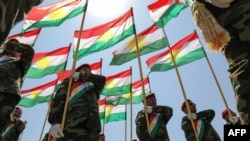In a significant escalation of aggression toward the Kurdistan Regional Government of Iraq, local officials confirmed that two "suicide drone" attacks by suspected Iran-backed Shiite militants late Saturday hit the key headquarters of Peshmerga forces in Pirmam, Irbil.
The district is the de facto stronghold of the ruling Masoud Barzani family and the Kurdistan Democratic Party.
Several sources familiar with the strikes, who spoke to VOA on the condition of anonymity, said the attack was aimed at the headquarters of Gulan special forces, less than 5 kilometers from the "Barzani Headquarters," where the former Kurdish president resides.
No Kurdish official was willing to comment on the proximity of the attack to the headquarters, but Irbil's governor called the attack "a dangerous development."
"Previously, the militias claimed to target only the coalition forces. But it turns out that they are also targeting the Peshmerga, Irbil and the Kurdistan Region," Governor Omed Khoshnaw told VOA via phone on Tuesday.
"The attack on the Peshmerga is a dangerous development, and we expect the Iraqi government to take a decisive stance. The Kurdistan Regional Government will not stand inert," he said.
Attacks since October
Suspected Shiite militants have staged dozens of drone attacks against targets in Irbil since the Israel-Hamas war began in October. Most of the attacks have been claimed by militias calling themselves "the Islamic Resistance in Iraq."
On Tuesday, Kurdistan's Counter-Terrorism Group, a government agency, said an armed drone fired by "illegal militia" against the Irbil airport was shot down at 9:52 a.m. local time. The statement said the drone was directed at the U.S.-led international coalition forces military base near the airport.
Reactions from Kurdish officials to the Saturday attack in Pirmam were particularly strong.
The Kurdistan Regional Government's spokesperson, Peshawa Hawramani, called it a "terrorist act" that "pushes for war."
In a statement, the Kurdistan Region's Peshmerga Ministry said, "The Peshmerga forces have the right to retaliate to protect our land and nation."
On Sunday, the Iraqi Security Media Cell said Iraqi Prime Minister Mohammed Shia al-Sudani has directed the security agencies to open a "comprehensive investigation into the criminal attack."
However, Kurdish officials remain skeptical of the Iraqi state's commitment to stopping such attacks and the ability of al-Sudani to contain the pro-Iran militants.
Speaking to VOA on Tuesday, Babakir Zebari, the military adviser for the Kurdistan Regional president, said al-Sudani "dislikes from his heart" the attacks on Irbil but cannot stop the militants.
"The groups attacking Irbil belong to the Popular Mobilization Forces," Zebari said. "These groups are extremists and do not obey the government, and they have previously attacked the house of the former Iraqi prime minister. Not all of the Popular Mobilization Forces are involved in the attacks, only some of the radical groups within it are responsible."
Khoshnaw said the Iraqi government still had the responsibility to act, because "those groups attacking Irbil get their financing and equipment from Iraq."
This story originated in VOA's Kurdish Service.







